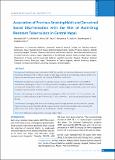Please use this identifier to cite or link to this item:
https://hdl.handle.net/20.500.14356/1763Full metadata record
| DC Field | Value | Language |
|---|---|---|
| dc.contributor.author | Marahatta, S B | - |
| dc.contributor.author | Adhikari, B | - |
| dc.contributor.author | Mishra, S R | - |
| dc.contributor.author | Raut, S | - |
| dc.contributor.author | Ramasoota, P | - |
| dc.contributor.author | Malla, P | - |
| dc.contributor.author | Kaewkungwal, J | - |
| dc.contributor.author | Singhasivanon, P | - |
| dc.date.accessioned | 2023-05-22T05:23:31Z | - |
| dc.date.available | 2023-05-22T05:23:31Z | - |
| dc.date.issued | 2015 | - |
| dc.identifier.citation | MarahattaS. B., AdhikariB., MishraS. R., RautS., RamasootaP., MallaP., KaewkungwalJ., & SinghasivanonP. (2015). Association of Previous Smoking Habit and Perceived Social Discrimination with the Risk of Multi-Drug Resistant Tuberculosis in Central Nepal. Journal of Nepal Health Research Council. https://doi.org/10.33314/jnhrc.v0i0.602 | en_US |
| dc.identifier.issn | Print ISSN: 1727-5482; Online ISSN: 1999-6217 | - |
| dc.identifier.uri | http://103.69.126.140:8080/handle/20.500.14356/1763 | - |
| dc.description | Original Article | en_US |
| dc.description.abstract | Abstract Background: Multidrug-resistant tuberculosis (MDR TB) caused by Mycobacterium tuberculosis resistant to both Isoniazid and Rifampicin with or without resistant to other drug, is among the most alarming pandemic problem. The objectives of this study was to assess the risk factors of MDR TB in Central Nepal. Methods: A matched case control study was conducted among 186 cases of MDR TB and 372 non-MDR TB controls from central region of Nepal. Pretested questionnaires containing socio-economic, cultural & behavioral; environmental, biological and health service factors were used. Variables significant in bivariate analysis were entered in multiple regression models for further analysis. Results: After adjusting for confounders, previous smoking habit (aOR= 4.5,(95%CI(1.24-16.2)) (p=0.04), and perceived social discrimination (aOR=5.83,95%CI (1.77-19.71)) (P=0.021) independently predicted greater MDR TB risk. Conclusions: Encouraging MDR TB cases for smoking cessation through awareness activities should be a priority. Stigma reduction programs should include the empowerment of patients and communities while promoting TB related research for further exploration into the risk factors of TB and associated stigma.  Keywords: Tuberculosis; drug resistance; smoking; stigma; Nepal | en_US |
| dc.language.iso | en | en_US |
| dc.publisher | Nepal Health Research Council | en_US |
| dc.relation.ispartofseries | Jan-April, 2015;602 | - |
| dc.subject | Tuberculosis | en_US |
| dc.subject | Drug resistance | en_US |
| dc.subject | Smoking | en_US |
| dc.subject | Stigma | en_US |
| dc.subject | Nepal | en_US |
| dc.title | Association of Previous Smoking Habit and Perceived Social Discrimination with the Risk of Multi-Drug Resistant Tuberculosis in Central Nepal | en_US |
| dc.type | Journal Article | en_US |
| local.journal.category | Original Article | - |
| Appears in Collections: | Vol. 13 No. 1 Issue 29 January - April 2015 | |
Files in This Item:
| File | Description | Size | Format | |
|---|---|---|---|---|
| 95_101.pdf | Fulltext Download | 235.41 kB | Adobe PDF |  View/Open |
Items in DSpace are protected by copyright, with all rights reserved, unless otherwise indicated.
